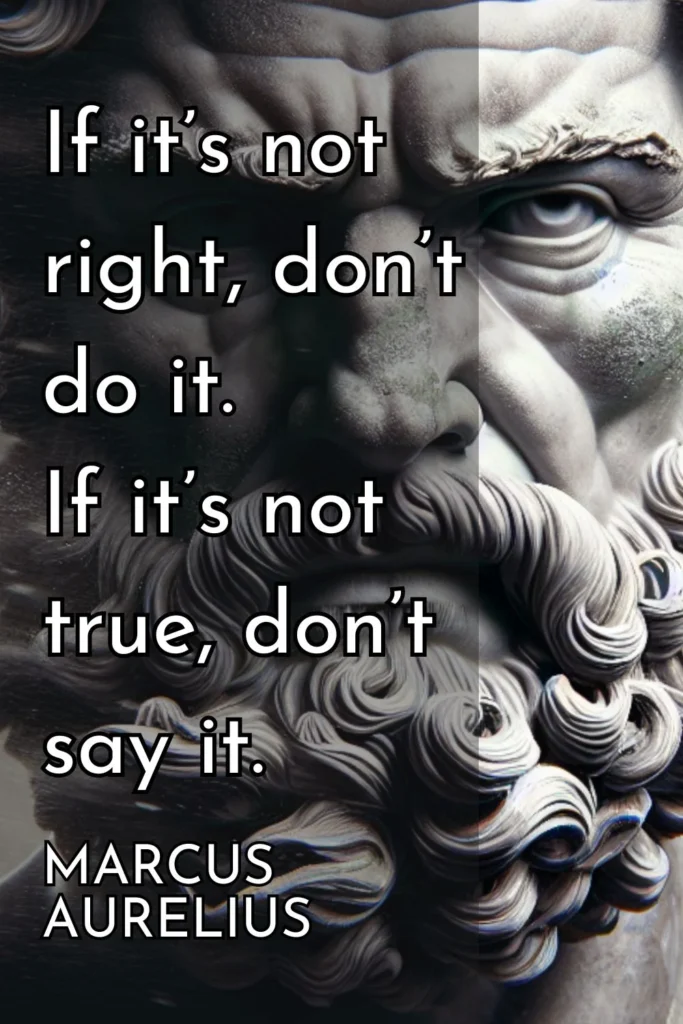Stoicism definition? It isn’t some museum philosophy. Stoicism philosophy works in real life. Whether you’re getting ghosted, disrespected at work, or stuck in traffic that makes you question your entire existence, there’s a Stoic mindset for that.
Stoicism started around 300 BCE in ancient Greece with Zeno of Citium, the OG founder of Stoicism. But the real fire came from legends like Epictetus, a former slave who dropped timeless wisdom bombs like “Some things are up to us. Most things aren’t.” And of course, the Roman emperor Marcus Aurelius, whose private journal, Meditations, has become the survival manual for anyone trying to stay sane and grounded in a world built to distract and derail you.
Yes, Stoicism is old. But it’s not outdated. In fact, with how wild life is now, it might be more relevant than ever.
Stoic Habit 1: Epictetus First Rule for Sanity
Let’s start with the golden rule of Stoic survival: control what you can, release what you can’t. If you only remember one thing from Epictetus, let it be this:
Some things are up to us. Most things aren’t.
Epictetus, once a slave and later one of the most respected Stoic philosophers, believed that peace begins the moment you stop trying to control the weather and start mastering your inner climate.
So, what did Epictetus believe about emotional control? He didn’t tell you to suppress feelings. He taught you to aim your energy where it actually matters. You can’t control traffic. Or rude coworkers. Or your ex’s new post. But you can control how you respond, how you carry yourself, and what you choose to focus on next.
Fighting battles that were never yours? That’s emotional bankruptcy. Every minute you spend raging over things beyond your reach is time stolen from your purpose. Epictetus wasn’t about that. He wanted you focused, calm, and dangerous in the best way—because your strength isn’t in dominating the world. It’s in not letting the world dominate you.
Stoic Habit 2: Secret Stoic Power Move
Most people walk around like emotional landmines—one rude comment, and boom, they explode. But a Stoic? A Stoic knows the power isn’t in the outburst. It’s in the pause.
As Marcus Aurelius wrote in Meditations:
The best revenge is to be unlike him who performed the injustice.
Emotional control is the flex. It’s choosing silence when you could snap. It’s holding your center when someone tries to drag you into their chaos.
So what’s the key? Train the pause. That sacred split-second between stimulus and reaction—that’s where your strength lives. Someone insults you? Pause. Someone cuts you off mid-sentence? Breathe. The world expects you to lose it. But Stoicism teaches you to hold the line.
Still think this is just ancient advice? Think again.
Imagine this scenario. You’re in a heated work meeting. Someone throws shade. Your ego wants to clap back—but you don’t. You stay cool. And guess what? You walk out respected, not rattled.
Stoicism and controlling emotions aren’t about being numb. It’s about staying in command. You don’t react—you respond. With clarity. With precision. With self-respect.
Stoic Habit 3: The Warrior's Discipline
Comfort is a trap. That soft couch, that easy excuse, that extra scroll—they’re all slowly stealing your edge. The Stoics knew this way before it became a self-help slogan. Seneca, one of the sharpest minds in Stoicism, embraced discomfort on purpose.
Why? Because comfort makes you soft. It lulls you into fragility. Seneca was rich, powerful, and still chose to wear rough clothes, eat plain food, and live simply at times. Not because he had to. Because he wanted to stay tough. Unattached. Ready.
Modern Stoicism? It’s not about togas and sandals. It’s about cold showers instead of comfort zones, skipping the elevator instead of skipping discipline, and choosing silence instead of digital noise.
Define Stoicism like this: it’s building calluses on your character. It’s prepping your mind for chaos so that when the real storm hits—breakup, loss, failure—you don’t flinch. You’ve trained for this. You don’t just survive discomfort. You choose it.
So ask yourself:
When’s the last time you did something hard on purpose?
When’s the last time you volunteered for struggle, not for the story, but for the strength?
That’s the warrior’s way. That’s the Stoic way.
Stoic Habit 4: Write It Down
The Meditations of Marcus Aurelius weren’t written to go viral. It wasn’t a flex. It was therapy. The most powerful man in the world—ruler of Rome—sat down every night and spilled his fears, flaws, and frustrations onto the page. Not for applause. For truth.
That’s what makes Meditations Marcus Aurelius one of the most honest books in philosophy, because it was never meant for us. It was Marcus, talking to Marcus. And that’s the blueprint.
Daily reflection isn’t just some feel-good routine. It’s mental self-defense. It slows the chaos. It catches bad habits before they spiral. It helps you see yourself clearly, without the noise, the ego, or the filters.
Want emotional stability? Start here.
You don’t need a fancy leather-bound journal. You need 5 quiet minutes and a pen that doesn’t quit.
Here are a few journal prompts inspired by Marcus Aurelius to armor your mind daily:
What did I do today that aligned with my values?
Where did I react instead of respond?
What am I holding onto that no longer serves me?
If today were my last day, did I show up like it?
Writing clears the fog. It grounds you. It makes you accountable not to a crowd, but to your code.
Stoicism isn’t just something you read. It’s something you write. Daily. Quietly. Ruthlessly honest.
Stoic Habit 5: Don’t Take Things Personally
Someone’s cold with you. Snaps at you. Ignore your effort. And your mind? Instantly goes into overdrive: “Did I mess up? Did I say something wrong?”
Stop. It’s not about you. That’s not just feel-good advice—it’s core Stoic philosophy.
Stoic meaning? Most people are walking around carrying their storms—stress, insecurity, ego. And when they project that onto you, it’s not a reflection of your worth. It’s a mirror of their chaos. You just happened to be standing there.
Seneca nailed it:
We suffer more in imagination than in reality.
Read that again. Most of your emotional pain doesn’t come from what happened—it comes from what you made it mean.
The Stoic mindset? Stop inheriting other people’s storms. You don’t have to carry every bad mood, snide comment, or passive-aggressive silence like it’s your fault. Let them own their energy. You protect yours.
This doesn’t mean you stop caring—it means you stop spiraling. You respond with clarity instead of reacting with self-doubt.
Real power isn’t taking everything personally. It’s choosing what deserves space in your mind.
Stoic Habit 6: Practice Compassion Without Craving Approval
Kindness isn’t weakness. But craving praise for it? That’s a trap. And Stoics didn’t fall for it. They helped others because it was right, not because they wanted applause or Instagram-worthy reactions.
Seneca said it best:
Help others—but don’t hand over your soul.
In other words, give without guilt, support without sacrificing yourself, and love without begging for it back.
4 Stoic virtues—wisdom, justice, courage, temperance—don’t include people-pleasing. That’s because Stoicism isn’t about bending to win approval. It’s about standing firm in your values, even when no one claps.
Here’s the test:
If you’re kind and someone shrugs it off, do you stay grounded or spiral into bitterness?
Because true compassion isn’t transactional. It’s a gift, not a performance.
The modern world says, “Be nice so people like you.”
Stoicism says, “Be good. Period.”
So show up. Be generous. But never trade your self-worth for someone else’s reaction.
Famous Stoics didn’t need validation. They had virtue. So do you.
Stoic Habit 7: Walk Away With Dignity
Not every battle is worth swinging for. Stoicism teaches you to stop confusing reaction with strength. Just because someone wants to drag you into the mud doesn’t mean you have to roll around in it.
Epictetus said:
If someone succeeds in provoking you, realize that your mind is complicit in the provocation.
This hits directly at emotional control. Walking away isn’t weakness—it’s refusing to give someone else access to your mental state.
Toxic people thrive on drama. They bait you. They poke. They push. But here’s the Stoic flex: you don’t bite. You observe. You pause. And then you walk away—not with bitterness, but with composure that rattles them more than any comeback ever could.
Here’s a short story about one of the famous Stoics, Cato.
At the public baths, Cato—Stoic to the bone—was shoved and struck. A scuffle broke out, but once the dust settled, Cato shocked everyone. He didn’t get angry, didn’t demand an apology. He simply said, “I don’t even remember being hit.” No drama. No ego. Just complete emotional control.
Like Seneca put it, true strength isn’t in revenge, but in not lowering yourself to petty offense. The truly great don’t hear the barking—they walk past it.
Emotional control isn’t silence—it’s strategy. It’s knowing when staying calm stings louder than shouting back. You’re not ignoring the disrespect—you’re just not letting it rewrite your character.
When someone disrespects you, you don’t need to explain, prove, or perform. Not storming out, not slamming doors—but choosing peace over pettiness with surgical precision.
Stoic Habit 8: Define Your Values
If you don’t define your values, someone else will. And spoiler alert: it probably won’t be someone who has your best interests in mind.
Principles of Stoicism in everyday life start here, by asking the hard question:
What do you stand for when no one’s watching?
Is it honesty? Discipline? Courage? Humility? Whatever it is—lock it in. Because your values are your compass.
Marcus Aurelius lived this daily. Emperor of Rome, surrounded by power, wealth, and temptation—but he didn’t chase applause.
If it’s not right, don’t do it. If it’s not true, don’t say it.
That’s one of the best Marcus Aurelius quotes on choosing character over comfort.
The truth is, life gets messy. People will test you. Pressure will push you. And if your values are soft, you’ll fold.
But if they’re carved in stone, you’ll walk through fire without blinking.
Define your values. Then guard them like they’re sacred. Because they are.
Stoic Habit 9: Stop Caring What They Think
You’ll never be free if you’re addicted to approval. And if anyone knew that, it was Marcus Aurelius. The guy ran an empire and still had haters. Did he let it shake him? Nope.
He wrote:
You value your own opinion less than a stranger’s.
What is Stoicism, if not the ultimate freedom from other people’s noise? It’s the art of trusting your voice more than the crowd’s echo. It’s choosing your values over their validation.
When someone rolls their eyes at your idea, ignores your message, or throws shade in public, let them. Their judgment says more about them than it ever will about you.
Stoicism and self-respect are a package deal. When you stop trying to make everyone happy, you finally start living by your values. That’s when you become solid—someone who stands for something real, not just someone who goes along to get along.
Stoic Habit 10: Accept Change Like a Warrior
Change isn’t the enemy—attachment is. And if that stings, good. That’s where growth starts.
Life moves. People evolve. Plans fall apart. The Stoics didn’t resist that—they trained for it.
This is the Stoic definition of emotional agility:
You don’t cling. You adapt. You pivot. You endure.
Just like Zeno of Citium, the founder of Stoicism, who lost everything in a shipwreck, and then turned that rock bottom into the foundation of a whole philosophy. That’s not a tragedy. That’s transformation.
Stoic beliefs prepare you for chaos by reminding you that nothing outside of your mind is promised. Not your job, not your routines, not even the people you love. That sounds harsh—until you realize it’s the key to real freedom.
You don’t break when the winds shift—you bend.
Because a true Stoic doesn’t wish for calm seas.
They train to sail through storms.
Stoic Habit 11: Alchemy of the Mind
Pain gets a bad rap. Most people dodge it, numb it, or drown it out with distractions. Stoicism doesn’t flinch. It looks pain in the eye and says: “Teach me.”
This is the alchemy of the mind—turning suffering into strength, setbacks into strategies, and scars into fuel.
Epictetus, once enslaved and later one of the greatest Stoic teachers, embodied this fully.
He didn’t escape hardship—he refined himself through it.
Difficulties show a person’s character. So when trouble comes, think of yourself as a wrestler whom God, like a trainer, has paired with a tough young buck. For what purpose? To turn you into Olympic-class material.
Epictetus is known for not avoiding suffering, but transforming it.
He called it “the art of living” – choosing to see pain not as punishment, but as preparation. Whether it’s heartbreak, failure, or betrayal—it’s raw material. It’s training.
When something happens, the only thing in your power is your attitude toward it; you can either accept it or resent it.
When you live Epictetus-style, you stop asking “Why me?” and start asking “What now?”
You stop resisting the pain and start mining it for wisdom, grit, and clarity.
Use the hurt. Burn it for fuel. That’s the Stoic move.
Because while others break down, you break through.
Stoic Habit 12: Live With Memento Mori In Mind
You’re going to die.
Yeah, not exactly small talk—but that’s the point.
In Stoicism, this isn’t some depressing thought—it’s a clarifying one.
It’s called Memento Mori – Remember you must die.
Nothing sharpens your priorities faster than remembering your time is limited.
You stop obsessing over awkward moments. You stop chasing approval from people who wouldn’t even show up to your funeral.
You start asking: “Is this how I want to spend my one short life?”
Stoic quotes like these don’t aim to scare you. They aim to wake you up.
To remind you that every minute you spend angry, distracted, or playing small is a minute you’ll never get back.
You say what needs to be said. You leave the room without regrets. You stop waiting for the “right time” and start living like now matters—because it does.






